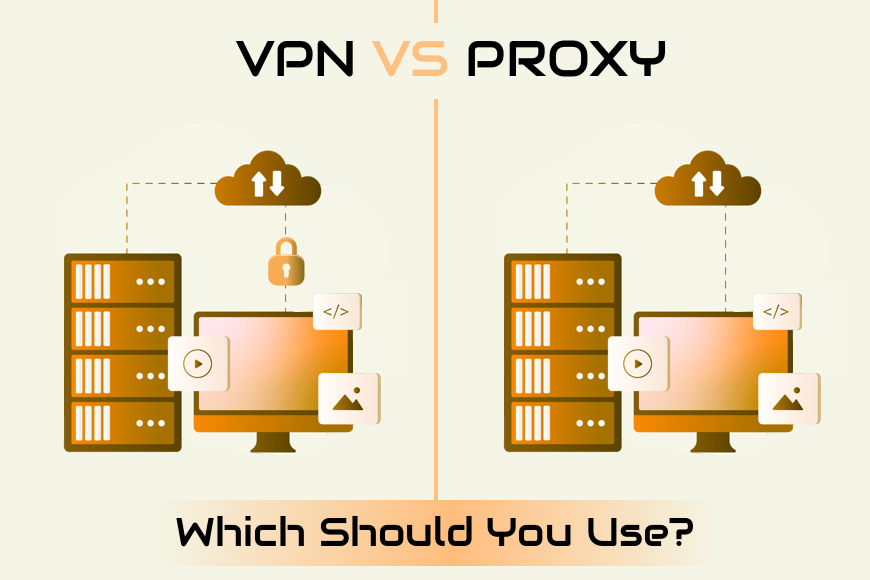The proliferation of technology has led us to rely on it more than ever. From work, shopping, ordering meals, transportation, and communication to research, almost everything can be done online. As technology’s influence on our lives grows, so does the risk of information security. In this article, we take a look at VPN vs Proxy, what they offer, and when to use them.
According to the information technology trade association CompTIA (Computing Technology Industry Association), the cost of cybercrime increased by 10% in the last year. In 2025, the average price of a data breach in the U.S. reached $9.44 million. The report also predicts that cybercrime will cost about $10.5 trillion each year by 2025.
This is why the use of virtual private networks (VPNs) and proxies has become indispensable because they can prevent users from being victimized by cybercrimes.
What Are VPNs and Proxy?
VPNs and proxies help protect the user’s identity by hiding their IP addresses. The two terms are used interchangeably in many contexts, but they are different.
A VPN is an online security service that disguises your online identity and encrypts your internet traffic. The encryption happens in real time, making it difficult for hackers to steal your data. While using this service, the VPN server becomes your main source of data, so your internet service provider (ISP) cannot detect the websites you visit or the data and files you send or receive online. In contrast, when data remains unencrypted, it can be viewed by anyone who has network access and has the ability to decode it. Read our Tunnelbear VPN review to know how this VPN is a better option than a proxy.
A proxy is a server that provides a gateway between the user and the Internet. Because of this intermediary, hackers have a harder time retrieving data that the user sends or receives over the Internet.
Every computer that is connected to the Internet has an IP (internet protocol) address. The gateway that serves as the proxy server has its own IP address that essentially hides yours.
To put it simply, a VPN provides an encrypted server, while a proxy is a gateway or intermediary server. Both provide protection, but which is better? To answer this question, let’s first discuss the benefits of VPN and proxy servers.
Benefits of Using a VPN over Proxy
VPNs are a must-have for any individual or organization that uses the Internet. Even if your business is small, hackers can still target your files. Interestingly, a Forbes article reports that small businesses are often targeted by hackers because they usually don’t invest in sophisticated security measures.
Yet another report — this time from the FBI — claims that the government agency received close to 850,000 complaints of cyberattacks and malicious cyber activities in 2021. The attacks were worth an estimated $6.9 billion, which is a 64% increase from the previous year. Small and medium businesses were the majority of the victims.
While a VPN can’t provide 100% guaranteed protection, it’s a good start. Check out the benefits of using one:
1. Secures Your Network
A VPN will secure your network and prevent cyber criminals from accessing your files or sending malware that locks you out of your own device. It can also prevent pop-up ads from interrupting your work. Though these ads may seem harmless, they can harvest data from your device.
2. Protects Private Data
With a VPN’s encryption, hackers won’t have access to your personal files and private data. Hence, sensitive information like credit card and bank account information are much safer with a virtual private network.
3. Prevents Bandwidth Throttling
Some of the advantages of using a VPN go beyond security. For example, it can help you avoid bandwidth throttling. This is when ISPs intentionally slow down your internet during certain online activities. With a VPN, your ISP won’t have any idea what your online activities are, so it can’t slow down your internet speed.
4. Provides Access To Geo-blocked Content
Another important feature of VPNs is that they give users the ability to access content that is otherwise blocked in their region. This is especially crucial among people who travel for work.
5. Scalability
It’s easy to provide VPN connections to a large number of people (like employees).
Benefits of Using a Proxy over VPN
Proxy servers are also helpful for hiding one’s online activities, but they also have a few additional benefits.
1. Enhanced Security
A proxy can act as a firewall that does not allow hackers to access your network and data.
2. Ad-Free Browsing
You can hide your online activities, such as shopping, browsing, and streaming, so that you won’t get flooded with unwanted ads and pop-ups. Besides interrupting your activities, these ads or pop-ups are also used to collect information from you.
3. Access to Location-Specific Content
Similar to a VPN, you could use your proxy server to gain access to content that’s exclusive to certain locations.
4. Blocks Access To Specific Sites
Companies may want to block some sites that they don’t want employees to gain access to, especially during office hours. Some companies block Facebook, for example, so that employees are not distracted at work.
What Are the Main Differences Between a VPN and Proxy?
Now that you know the benefits of using VPNs and proxies, they may still appear to be indistinct since most of the benefits are similar. Let’s take a look at the differences.
Data Protection
VPN protects all the data you access, send, or receive using your device. A proxy will only protect your browser or a specific app. Even if this is the case, hackers will still have a hard time infiltrating your system because a proxy acts as a firewall.
So, when it comes to data, a VPN provides broader protection since it isn’t limited to your chosen browser or app.
Encryption
A VPN encrypts your data and traffic, which prevents any type of hacking, tracking, or surveillance. Meanwhile, there is no encryption in a proxy. If your work involves handling sensitive information, you’re better off using a VPN than a proxy.
The downside of encryption is it makes a VPN slightly slower than a proxy. But, as long as you get a good VPN service, the speed difference should be negligible.
Cost
There are some free VPNs, and there are plenty of free proxies. However, if you want reliable security, you should invest in paid VPN or proxy servers. VPN is usually more expensive, but it also has more advantages.
Should You Use a VPN or Proxy?
VPN provides better protection because of its encryption, privacy, and security. It’s slightly more expensive, but it’s worth it. This doesn’t mean that proxies don’t have value. If your only choice is a proxy server, it’s still better than having no protection at all.
Bottom Line
A 2018 report by Juniper Research predicted that by the end of 2024, cybercriminals would have stolen around 33 billion records. To think that just one stolen record can jeopardize a person’s life and career.
The security of our computer systems may not seem that important if we’ve never encountered a serious breach before. But — just like insurance — it’s much better to have it and not need it than need it and not have it.

